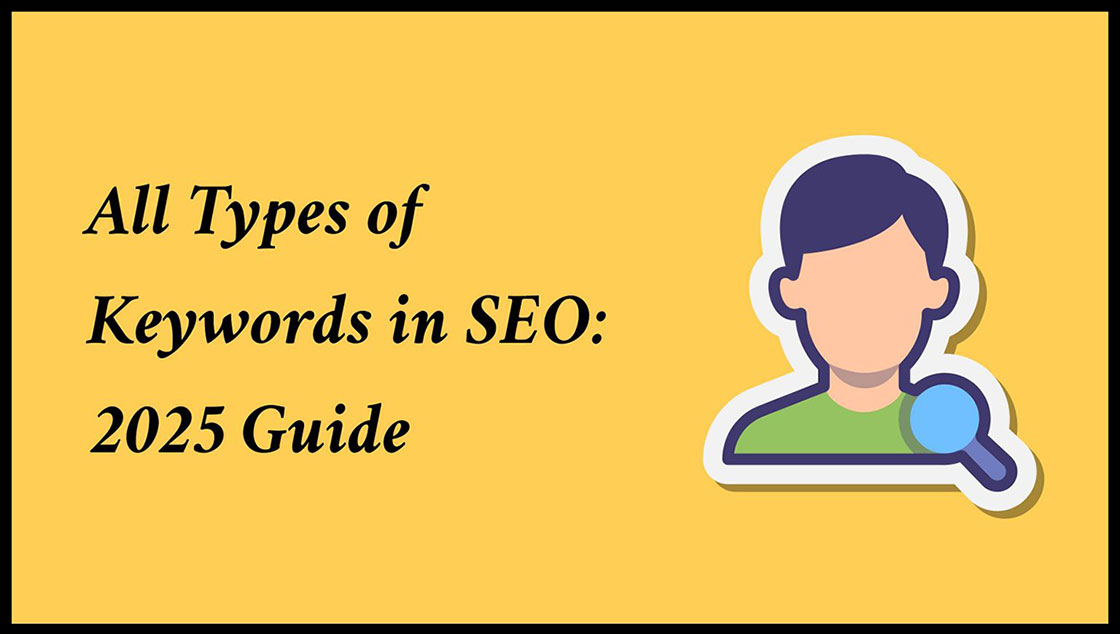All Types of Keywords in SEO: 2025 Guide

SEO revolves around one core principle: matching up the searched element to the content that provides answers. Keywords are at the center of this process. Keywords are a set of words users put in search engines to obtain needed information.
This guide explains everything you should know about the various types of SEO keywords and why they’re so important in relation to an overall SEO strategy.
What are SEO Keywords?
It basically means that the base of SEO consists of keywords that denote the general words or phrases that are typed into a search engine in the effort of locating something a user wants: an answer, product, or service. A man searching for fitness tips will use such words as “best workout for beginners” or “guide to fitness at home.”.
These keywords have come to form a bridge between customers and business entities. Once you identify the keywords to use and incorporate them into your content, you stand a better chance of being found by those looking for your services.
Why are Keywords Important in SEO?
More than simple keywords, they’re powerful tools to:
Drive Organic Traffic: The right use of keywords elevates your website to top positions on SERPs.
Target the Right Audience: It helps filter in users who are very interested in your offerings.
Improve Conversion Rates: High-intent keywords pull users closer to purchasing your product or availing of services.
Support Content Strategy: Keywords ensure that the development of the content is appropriate, appealing, and serves user needs.
For instance, if your target audience searches for eco-friendly products, using a keyword like “sustainable fashion brands” or “environmentally friendly home goods” will align with the intent of their search.
What is the Role of Keywords in SEO?
Keywords are like signposts that show the way to search engines where your content is. Here’s how they work:
Content Optimization: Keywords help optimize your blogs, landing pages, and product descriptions for search engines.
On-Page SEO: Using keywords in titles, meta descriptions, and headings enhances the ranking potential of your site.
Audience Insights: Studying the keywords your audience uses offers a great insight into their behavior and preferences.
Competitive Advantage: The research and targeting of niche or long-tail keywords could be your unique strength over the competition in your industry.
Type of Keywords in SEO
Being able to differentiate the type of keywords is important for an integrated approach to SEO. Let’s dive into key categories.
1. Informational Keywords
Informational keywords address the questions of users who seek to know something. These usually contain the words “how to,” “what is,” and “why.”
Examples:
“How to start a blog”
“What is cryptocurrency?”
How to Use Them:
You should create comprehensive guides, tutorials, or even blog articles based on such keyword targeting. Besides getting good volumes of traffic, this helps to increase authority within your niche.
2. Commercial Keywords
Commercial keywords are usually for users who are considering making a purchase but are still in their research phase. These could include any words like “best”, “top”, or “review “.
Examples:
“Best laptops for gaming”
“Top online courses for marketing”
How to Use Them:
Write comparison articles, product reviews, or listicles that highlight the benefits of specific products or services.
3. Navigational Keywords
Navigational keywords are used by users looking for a specific brand, website, or product.
Examples:
“LinkedIn login”
“Amazon Prime membership”
How to Use Them:
Ensure your website ranks for branded keywords to make it easy for users to find you directly.
4. Short Tail Keywords
Short tail keywords, also called head terms, are broad and general. They typically consist of one or two words.
Examples:
“Shoes”
“Fitness tips”
Pros and Cons:
While they attract high traffic, they’re highly competitive and may not always bring qualified leads due to their vague intent.
5. Long Tail Keywords
Long tail keywords are longer, more specific phrases that often indicate clear user intent.
Examples:
“Affordable hiking boots for beginners”
“SEO tools for small businesses in 2025”
How to Use Them:
Focus on these keywords for targeted traffic. They may have lower search volume, but they yield higher conversion rates.
6. Branded Keywords
Branded keywords include your business name, products, or services.
Examples:
“Apple MacBook Air features”
“Nike running shoes deals”
How to Use Them:
Protect your brand identity by ranking for your branded keywords. This helps maintain trust and credibility.
7. Generic Keywords
Generic keywords are broad and do not include brand names. They often reflect general user interest.
Examples:
“Smartphones”
“Online courses”
How to Use Them:
Incorporate these into your broader SEO strategy to attract traffic and raise awareness about your niche.
8. Customer-Centric Keywords
Customer-centric keywords are tailored to address the specific pain points or needs of your audience.
Examples:
“Best solutions for small business accounting”
“How to save energy at home”
How to Use Them:
Develop content that speaks directly to user challenges. This builds trust and drives engagement.
Practical Tips for Keyword Optimization
The best way to make the most out of your keywords is by following these best practices:
Research Ample: Effectively identify high-value and highly relevant keywords with tools such as Google Keyword Planner, Ahrefs, or SEMrush.
Analyze Search Intent: Truly understand whether users are seeking to find information, make a purchase, or navigate to a specific site with clear intent understanding.
Relevance: Target only highly specific and valuable keywords that best meet the requirements of your content and audience.
Optimize On-Page Elements: Use keywords naturally in titles, meta descriptions, headings, and within your content for better search rankings.
Monitor Performance: Keep a regular check on keyword ranking and analytics of the website, changing your SEO strategy based on performance insights from data.
Conclusion
Keywords are crucial for any SEO strategy. Understanding their types and roles will help you create content that attracts the right audience, enhances the visibility of your website, and ensures meaningful engagement.
Whether you’re targeting informational, commercial, or customer-centric keywords, the bottom line is to make sure your strategy is aligned with user intent. Keep in mind, that SEO isn’t about ranking; it’s all about value and relationship-building with your audience.
In 2025, keyword competition will be even more brutal, and one needs to stay on top with an all-rounded and informed approach.

